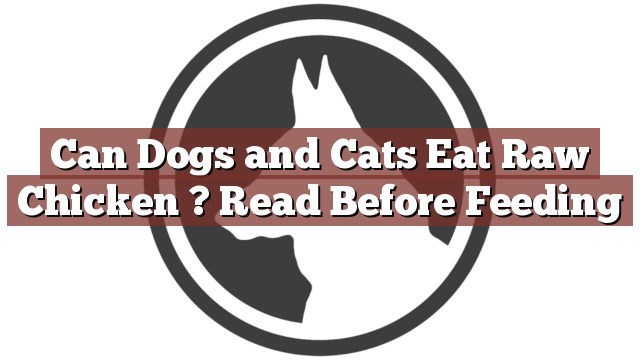Understanding Your Dog’s Dietary Needs
Proper nutrition is essential for the overall health and well-being of our beloved pets. As responsible pet owners, it is crucial to understand our dog’s dietary needs to ensure they receive a balanced and nutritious diet. Dogs are omnivores, which means they can consume both meat and plant-based food. They require a mix of protein, carbohydrates, fats, vitamins, and minerals to thrive.
Can Dogs and Cats Eat Raw Chicken? Read Before Feeding
Can dogs eat raw chicken? This question often arises among pet owners looking for alternative feeding options. The answer is yes, dogs and cats can eat raw chicken, but it comes with some considerations. Raw chicken contains essential nutrients like protein, amino acids, and fatty acids that are beneficial for their health. It can be a natural and wholesome addition to their diet. However, it is crucial to follow certain guidelines to ensure the safety of our pets.
Pros and Cons of Feeding Raw Chicken to Dogs and Cats
Feeding raw chicken to dogs and cats has its pros and cons. One of the main advantages is the high nutritional value it provides. Raw chicken is rich in protein, which helps in muscle development and repair. It also contains essential fatty acids that promote healthy skin and a shiny coat. Additionally, the bones in raw chicken can be a good source of calcium.
However, there are potential risks associated with feeding raw chicken. Raw meat can be contaminated with bacteria such as Salmonella or E. coli, which can cause illness in both pets and humans. It is vital to handle raw chicken with care, ensuring proper hygiene and cleanliness. Another concern is the risk of choking or bone splintering if the bones are not adequately prepared or if the pet gulps them down without chewing.
Conclusion: Considerations for a Balanced and Safe Diet
Feeding raw chicken to dogs and cats can be a viable option, but it requires caution and proper understanding. If you decide to incorporate raw chicken into your pet’s diet, make sure to follow these guidelines:
-
Consult with your veterinarian: Seek professional advice to determine if raw chicken is suitable for your pet’s specific dietary needs and health condition.
-
Proper handling and preparation: Practice good hygiene when handling raw chicken, keeping it separate from human food and using separate utensils. Thoroughly wash any surfaces that come into contact with raw chicken.
-
Choose quality sources: Select high-quality, organic, and hormone-free chicken to minimize the risk of contamination.
-
Prepare bones safely: Never feed cooked bones to your pets as they can splinter and cause serious damage. If you choose to feed raw bones, ensure they are the appropriate size and texture for your pet to chew safely.
Remember, a balanced and varied diet is key to your pet’s overall health. It is advisable to consult with a veterinarian or a professional pet nutritionist to determine the best feeding plan for your furry friend.
Thank you for taking the time to read through our exploration of [page_title]. As every dog lover knows, our furry friends have unique dietary needs and responses, often varying from one canine to another. This is why it's paramount to approach any changes in their diet with caution and knowledge.
Before introducing any new treats or making alterations to your dog's diet based on our insights, it's crucial to consult with a veterinarian about [page_title]. Their expertise ensures that the choices you make are well-suited to your particular pet's health and well-being.
Even seemingly harmless foods can sometimes lead to allergic reactions or digestive issues, which is why monitoring your dog after introducing any new food item is essential.
The content provided here on [page_title] is crafted with care, thorough research, and a genuine love for dogs. Nevertheless, it serves as a general guideline and should not be considered a substitute for professional veterinary advice.
Always prioritize the expert insights of your veterinarian, and remember that the health and happiness of your furry companion come first.
May your journey with your pet continue to be filled with joy, love, and safe culinary adventures. Happy reading, and even happier snacking for your canine friend!

